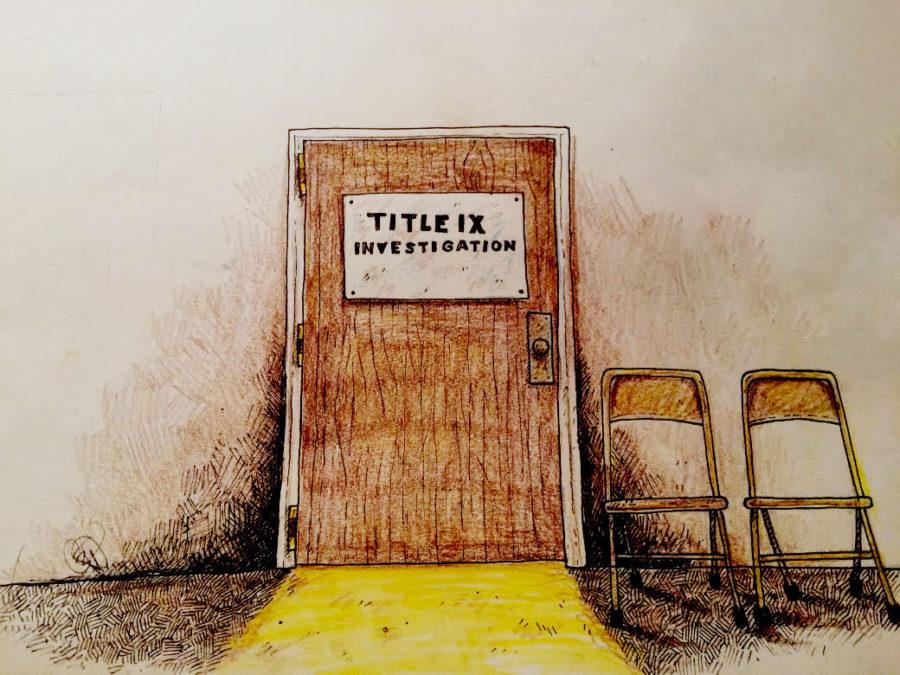(Update) Behind closed doors: As the courts have trudged along for more than a year, experts worry that the public’s right to know suffers
September 8, 2017
UPDATE: UK spokesman, Jay Blanton, has pointed out that this article lacks substantial representation of UK’s side of this issue. For the sake of fairness, quotes, from Blanton representing the university, have been added.
In light of a recent federal lawsuit filed against UK by a student and the current status of UK’s case against the Kernel, experts say the UK community could be at risk.
Frank LoMonte, the former executive of the Student Press Law Center, warns that students could be in danger while UK’s suit with the Kernel is being decided.
“It’s a good bet that there are employees walking around your campus right now who’ve been accused of multiple acts of serious wrongdoing that the university covered up,” LoMonte said. “The only way of knowing is for the university to come clean about the public records its been hiding.”
Blanton stresses that UK is justified by the decisions of two Fayette circuit court judges.
“UK is widely viewed as a national leader in its pursuit of creating a community that is safe for everyone, particularly in the area of sexual assault,” Blanton said. “The result of the Kernel’s approach to its coverage, however, is that readers likely don’t know that in two different courtrooms, two different judges have essentially agreed with the university’s position – that the right to privacy of students and victim-survivors takes precedence over an open records request.”
As the Kernel’s case has worked its way through the courts, a student filed a new lawsuit against UK questioning the university’s handling of sexual assault investigations.
A woman, listed as Jane Doe, said, in her suit against UK, that she was raped twice by two different students during the 2016 school year and, she alleges, that university officials did not protect her from her assailant or provide her with measures to safely pursue her academic studies.
The lawsuit said that Jane Doe suffered socially and academically as a result of sexual assault and the mishandling of her case by university officials. She said that even after the investigation began, she was retaliated against by members of the assailant’s fraternity and was once followed home by her assailant.
Nadia Almasalkhi, an officer with the UK Feminist Alliance said the Title IX office should have been faster and should not have allowed contact between a victim and their assailant.
“I’m sure paperwork moves slowly, but student’s lives don’t,” Almasalkhi said.
Meanwhile, Kentucky’s Court of Appeals will decide in the coming months if UK is justified in withholding documents related to a different controversial university sexual assault investigation.
Paidin Dermody, the Kernel’s current editor-in-chief, said UK’s withholding of documents hurts past and future victims of sexual misconduct in public institutions.
“The ongoing lawsuit diminishes the dignity of the victims, which they deserve to have fully restored,” Dermody said. “It also endangers innocent individuals destined to cross the paths of these perpetrators, who’s continued existence is legitimized within the university environs by the enabling behavior of those same institutions.”
Almasalkhi agreed.
“The people who are really in danger are the future students and the future classmates of the assailants,” Almasalkhi said. “Under the way this university is acting now, someone could request information about an assailant and be denied that information.”
Throughout the case, UK spokesman Jay Blanton has maintained the university’s opinion that a release of the documents may reveal the identities of the case’s victim-survivors.
“UK wholeheartedly agrees that openness and transparency are important,” Blanton said. “They are bedrock values we share as a university. But that doesn’t mean that the right to privacy and safety of students and victim survivors should be sacrificed on the altar of the open records law.”
LoMonte is suspicious of the contents of the withheld documents.
“UK is really out there on a very extreme limb by itself in clinging to the secrecy of these documents,” LoMonte said. “[A]nd you have to ask yourself what President Capilouto knows has been going on inside his administration that he is so determined for the public never to find out.”
UK’s ongoing lawsuit with the Kernel and the attorney general is entering its next chapter. The Fayette circuit court ruled against the Kernel in January, and against the attorney general in August. The Kernel and Attorney General Andy Beshear both vowed to appeal.
That’s where the case sits now—locked in the appeal process after two decisions in favor of the university.
The events that led to Beshear and the Kernel’s cases began in March 2016, when a spokesman for two female graduate students approached the Kernel stating that the students’ adviser, James Harwood, had sexually assaulted them and was under university investigation.
The students were unhappy because their alleged assaulter would be allowed to resign before a public hearing would occur—effectively allowing him to leave UK without the sexual misconduct charges following him.
The Kernel published a story in April 2016 detailing an agreement reached between UK and associate professor Harwood. The next day, the Kernel filed an open records request for more documents on UK’s investigation of Harwood but the university refused to give up the documents.
The Kernel appealed to Beshear’s office. In Kentucky, the attorney general has the power to decide if documents should be made public. In this instance of sexual misconduct, the Kernel and the victims felt that the investigation of Harwood should be made public, but with the redaction of names or any information that would allow for the victims to be identified—common journalistic practice. The attorney general agreed.
UK again refused to give up the documents, and decided to appeal Beshear’s decision. To appeal, UK sued the Kernel in circuit court. Beshear intervened by opening suit against UK.
Meanwhile, the Kernel obtained the full investigation from a confidential source, and began printing details from the investigation. A development that, according to a January NPR piece, worried the victims.
Leading up to the circuit court hearing, the victims filed on the side of UK. They cited growing concerns that continued Kernel coverage would soon lead to the exposure of their identities.
The law firm representing the victims had a previous history of working with UK, according to Tom Miller, the Kernel’s attorney.
Before the Fayette circuit court, UK argued that the documents could not be released because they were protected by the Family Educational Rights and Privacy Act. FERPA would call for the documents to be protected, but only if the documents were student records.
In January, the court ruled in favor of UK. The court found that, even with identifiers redacted, a public release of the documents would identify the victims. The Kernel vowed to appeal.
Last month, a circuit court judge ruled against Beshear. A Lexington Herald-Leader report said the court found the documents were indeed protected by FERPA and Beshear would not be allowed to review the documents for public release. Beshear vowed to appeal.
Miller said the Kernel’s legal team has filed its briefs—or written arguments, and is now waiting on other organizations to file on the side of the Kernel. Miller expects multiple press organizations to join the Kernel’s side.
After those organizations file, UK will begin to file their briefs. Miller said it is possible that the victims in the sexual assault investigation may file on the side of the university just as they did in circuit court.
Once both sides have filed, the court will decide if oral arguments are necessary. If they are not, the court will come to a resolution based on the arguments that have been filed.
“We should have a resolution in the Court of Appeals within a year,” Miller said. “But UK has made clear that if they lose, they will file a motion for discretionary review with the Kentucky Supreme Court.”
The attorney general’s case is not as far along. Last month, Beshear’s office gave their notice of appeal—the first step in the appeals process.
“[T]he very existence and effectiveness of Kentucky’s Open Records Law is in jeopardy,” Beshear said in a recent interview with the Kernel. “[UK]’s approach creates a silver bullet where any state agency that doesn’t want to provide a document can simply claim a Federal privacy law.”
Blanton hopes that future coverage will be more balanced.
“Two judges have now agreed with the university’s position on this critical issue of public safety and personal privacy,” Blanton said. “We don’t expect the Kernel to agree. We can – and often should – have respectful differences of opinion on important matters of public policy. But our hope is that in the interest of fairness and balance, the Kernel would tell all sides of that story, not just the one with which they agree.”
























































































































































